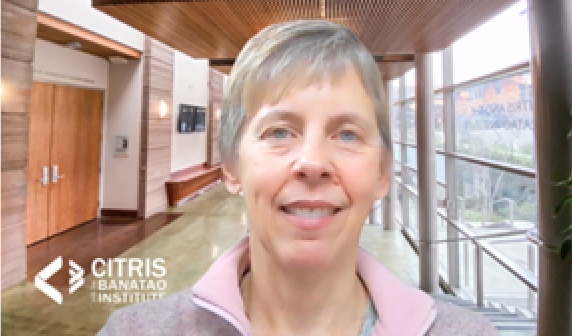By Jackie Brown. Currently, artificial intelligence (AI) is playing an increasingly prominent role in shaping our world and daily lives. On October 25, 2023, UC Tech members shared key takeaways during the Networking event: UC Tech discussion session on the recent “Future of AI” distinguished speaker series. Camille Crittenden, Executive Director of the Center for Information Technology Research in the Interest of Society and the Banatao Institute (CITRIS), and the UC Tech blog news team hosted the event. This news article summarizes insights and concerns raised among the 75 guests during the discussion. Many expressed the desire to continue to stay in touch regarding this important topic. Please add your name to this form to be included in similar conversations in the future.
The background on “CITRIS Research Exchange”
CITRIS is a multi-campus organization comprising the UC campuses at Berkeley, Davis, Merced and Santa Cruz, and reports to the UC Office of the President’s Vice President for Research and Innovation, Theresa Maldonado. For over a decade, the CITRIS Research Exchange has invited current UC faculty researchers and outside experts to speak as part of this lecture series. During the Spring 2023 semester and Fall 2023 semester, CITRIS, in partnership with UC Berkeley’s College of Computing, Data Science, and Society the Berkeley AI Research Lab, focused the speaker series on AI advancements and their implications. The discussions are designed to address important facets of AI including technical and social aspects.
Jaron Lanier’s insights
One of the speakers featured in the series was Jaron Lanier, a renowned figure from Microsoft Research. Lanier’s talk was centered around the societal implications of AI and data ownership. He emphasized the fragmented nature of AI, which contradicts the notion of AI as monolithic. Participants in the discussion group shared their thoughts on Jaron Lanier’s presentation. One participant shared how Lanier’s perspective challenges the extreme view that AI is either a savior or a threat to humanity. Another member mentioned his focus on data dignity and how sharing the benefits of AI with the people who contribute to its algorithm makes AI similar to a social media platform.
Intellectual property and data ownership
The conversation shifted towards intellectual property issues, with a legal expert sharing concerns about ownership in the context of AI-generated outputs. The discussion touched on the challenge of determining what constitutes intellectual property in AI and the need for clear terms and conditions to define ownership in the present and future.
Alison Gopnik’s talk on AI and child learning
The discussion group also discussed Alison Gopnik, a developmental psychologist who draws parallels between AI and child learning. Gopnik highlighted how far AI must go to match the learning and understanding capabilities of children. Participants discussed examples such as children’s exploratory learning versus AI’s rigid problem-solving approaches.
AI and decision-making
The discussion expanded to concerns about AI-assisted decision-making involving individuals. Participants raised questions about AI’s potential to embed bias in its recommendations and the need to comprehend AI’s decision-making processes. Additionally, concerns were voiced about AI’s influence on people’s behavior, especially in the context of targeted advertising and personalized content.
Anca Dragon on robot training
Anca Dragan is a roboticist and AI expert who covered the complexities of creating successful AI. Crittenden referenced a key point from Dragan’s talk from The Sorcerer’s Apprentice in Disney’s Fantasia. In this scene the Sorcerer tries to train the broom to wash the floor by bringing buckets. However, the Sorcerer does not implement a restriction on the broom, and it continues bringing water buckets which leads to flooding. This example demonstrates how automation could potentially get out of control if developers do not implement guardrails or issue explicit instruction about the outcome versus the process.
Government regulations and partnerships
The conversation also delved into the possible need for government regulations and academic partnerships in the field of AI. Participants discussed potential frameworks for AI safety and the importance of creating guidelines to ensure responsible AI development. Government initiatives, such as Senator Weiner’s SB 294, the Safety in Artificial Intelligence Act was brought up as an example of a legal framework. Another participant informed listeners about California Governor Gavin Newsom’s executive order regarding AI within the state government.
Networking opportunity and potential for future collaboration
The discussion group ranged from AI’s intellectual property and data ownership to concerns about bias and influence on individuals. Many participants emphasized the need for clear regulations and discussions to mitigate AI’s ethical and privacy concerns.
The CITRIS Research Exchange will continue in Spring 2024. The UC IT Tech News team is hoping to host future events such as the one profiled here to provide individuals a chance to discuss tech topics and network with employees in the UC community. We have created a list of those interested in joining this listserv. Please complete this form if you would like to be added.
RELATED READING
AI speaker series to explore discoveries, societal impacts and future
UC Berkeley College of Computing, Data Science and Society
August 29, 2023
Contact
Camille Crittenden, Ph.D.
Executive Director of CITRIS and the Banatao Institute
Co-Founder of the CITRIS Policy Lab and the Women in Tech Initiative at UC
Author
Jackie Brown
Marketing & Communications Intern
UC Office of the President

